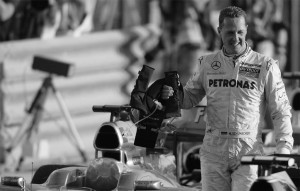
F1 legend Michael Schumacher attempted a comeback with the Mercedes Formula One team but retired permanently in 2012.
More than three months after suffering a near-fatal blow to the head during a family ski trip, legendary Formula One race champ Michael Schumacher is reported to be showing “moments of consciousness and awakening,” according to his manager, perhaps the first significantly positive sign since he was injured in the Alps on December 29th.
The announcement is one of the rare details of the race star’s medical progress since shortly after Schumacher tumbled over some hidden rocks, hitting the right side of his head hard enough to crack his helmet.
“Michael is making progress on his way,” manager Sabine Kehm, said in a statement released today. “He shows moments of consciousness and awakening.”
The terse statement also noted that the seven-time F1 world champion remains under treatment in a hospital in Grenoble, France.
Earlier this week, London newspaper the Mirror reported that Schumacher’s wife Corinna had approved the construction of a $16 million medical facility at their home on Lake Geneva, in Switzerland where the 45-year-old Schumacher could soon be transferred. That possibility was not addressed by manager Kehm’s prepared statement.
(GM facing pressure to park 2.5 mil vehicles involved in ignition switch recall. Click Here for the latest news.)
As has been the family’s policy since shortly after the skiing accident, Kehm said the Schumachers “do not intend to disclose details. This is necessary to protect the privacy of Michael and his family, and to enable the medical team to work in full calmness.”
But the possibility that Schumacher, who retired from F1 after the 2012 season, might be clawing his way back to consciousness would be a significant development considering medical experts have warned a recovery is unlikely.
(Tumultuous relationship with supplier may have been critical factor in GM ignition switch debacle. Click Herefor this exclusive report.)
“Schumi,” as his many fans call the racer, was skiing off the normal trails with his 14-year-old son on December 29th when, an investigation determined that his skis struck hidden rocks, catapulting him forward. He struck another rock on the side of the face, immediately rendering him unconscious.
Doctors in Grenoble operated quickly and removed a number of blood clots from the brain, but others were too deep to safely reach. The medical team chose to induce a coma, a procedure often used after traumatic brain injuries to reduce the risk of swelling. But medical experts warned that the longer Schumacher remained in that state the less likely it would be he could ever emerge – or if he did, Schumacher might be condemned to a permanent vegetative state.
The “longer one remains in a vegetative state, the less the likelihood of emerging,” former Formula One chief doctor Gary Hartstein wrote in a blog post last week, “and the higher the chances of severe ramifications if the patient does in fact emerge. Most definitions consider the vegetative state to be permanent one year after the injury.”
“For anyone, that is a catastrophe,” the Mirror quoted an unnamed friend of the Schumacher family. “For someone who lived in the fastest of lanes, you can imagine what it means to his family.”
During most of his career, Schumacher raced under the Ferrari banner and earned a reputation for hiss intense – some would say ruthless – focus. All told, he won an astonishing 91 races. After a seventh F1 championship, Schumacher briefly retired. Lured back to the track, he staged a brief but less successful comeback attempt before hanging up his uniform for good in 2012.

Let’s hope Michael recovers from this tragic accident. He’s got a long road ahead.
ForzaMichael